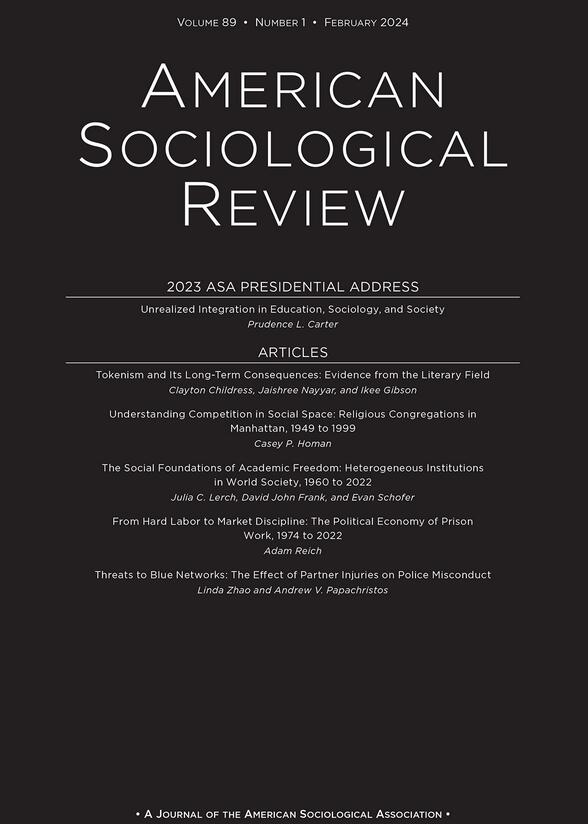Taking the Time: The Implications of Workplace Assessment for Organizational Gender Inequality
IF 6.2
1区 社会学
Q1 SOCIOLOGY
引用次数: 2
Abstract
Gendered differences in workload distribution, in particular who spends time on low-promotability workplace tasks—tasks that are essential for organizations yet do not typically lead to promotions—contribute to persistent gender inequalities in workplaces. We examined how gender is implicated in the content, quality, and consequences of one low-promotability workplace task: assessment. By analyzing real-world behavioral data that include 33,456 in-the-moment numerical and textual evaluations of 359 resident physicians (subordinates) by 285 attending physicians (superordinates) in eight U.S. hospitals, and by combining qualitative methods and machine learning, we found that, compared to men, women attendings wrote more words in their comments to residents, used more job-related terms, and were more likely to provide helpful feedback, particularly when residents were struggling. Additionally, we found women residents were less likely to receive substantive evaluations, regardless of attending gender. Our findings suggest that workplace assessment is gendered in three ways: women (superordinates) spend more time on this low-promotability task, they are more cognitively engaged with assessment, and women (subordinates) are less likely to fully benefit from quality assessment. We conclude that workplaces would benefit from addressing pervasive inequalities hidden within workplace assessment, equalizing not only who provides this assessment work, but who does it well and equitably.花时间:工作场所评估对组织性别不平等的影响
工作量分布的性别差异,特别是谁把时间花在晋升能力低的工作场所任务上——这些任务对组织来说至关重要,但通常不会导致晋升——导致了工作场所持续存在的性别不平等。我们研究了性别如何与一项低晋升能力工作任务的内容、质量和后果有关:评估。通过分析真实世界的行为数据,包括美国八家医院285名主治医生(上级)对359名住院医生(下属)的33456次即时数字和文本评估,并结合定性方法和机器学习,我们发现,与男性相比,女性就诊者在对住院医生的评论中写的词更多,使用了更多与工作相关的术语,更有可能提供有用的反馈,尤其是在居民遇到困难时。此外,我们发现,女性居民不太可能接受实质性评估,无论参加的性别如何。我们的研究结果表明,工作场所评估在三个方面是性别化的:女性(上级)在这项低晋升能力的任务上花费更多的时间,她们在认知上更投入评估,女性(下属)不太可能从质量评估中完全受益。我们得出的结论是,工作场所将受益于解决工作场所评估中普遍存在的不平等问题,不仅让谁提供这种评估工作,而且让谁做得好、公平。
本文章由计算机程序翻译,如有差异,请以英文原文为准。
求助全文
约1分钟内获得全文
求助全文
来源期刊

American Sociological Review
SOCIOLOGY-
CiteScore
13.30
自引率
3.30%
发文量
35
期刊介绍:
The American Sociological Association (ASA) is a non-profit membership association established in 1905. Its mission is to advance sociology as a scientific discipline and profession that serves the public good. ASA is comprised of approximately 12,000 members including faculty members, researchers, practitioners, and students in the field of sociology. Roughly 20% of the members work in government, business, or non-profit organizations.
One of ASA's primary endeavors is the publication and dissemination of important sociological research. To this end, they founded the American Sociological Review (ASR) in 1936. ASR is the flagship journal of the association and publishes original works that are of general interest and contribute to the advancement of sociology. The journal seeks to publish new theoretical developments, research results that enhance our understanding of fundamental social processes, and significant methodological innovations. ASR welcomes submissions from all areas of sociology, placing an emphasis on exceptional quality.
Aside from ASR, ASA also publishes 14 professional journals and magazines. Additionally, they organize an annual meeting that attracts over 6,000 participants. ASA's membership consists of scholars, professionals, and students dedicated to the study and application of sociology in various domains of society.
 求助内容:
求助内容: 应助结果提醒方式:
应助结果提醒方式:


